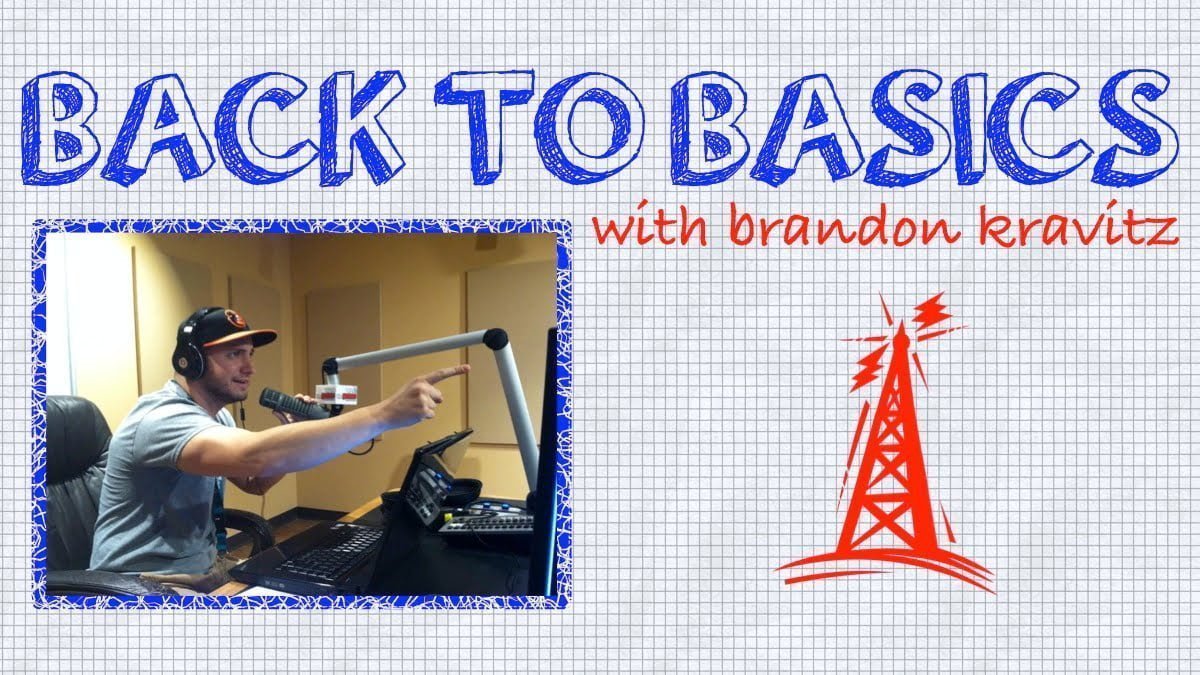Have you ever heard a song that seems as though it’s about absolutely nothing or at least absolutely nothing you understand? Perhaps the beat and hook are catchy, you might bob your head, but the song will never truly connect unless you can relate to the lyrics.

Sports talk radio operates a similar way with its audience, you can have a smooth voice and a nice delivery, but if you are not relaying the proper context to back up the discussion you’re having on air, you miss an opportunity to maximize its potential and you risk losing your listener in the moment.
One of the reasons I find the audio/talk industry so fascinating is that it forces you to master the art of telling a story, setting up a topic, replaying the image of a game the night before without the accessibility of showing your listener what it is you are talking about. You are painting a picture and there is nuance to it that can be very hard to appreciate if you don’t have the ability to add a visual.
I hear it all the time now with these simulcast TV/radio sports talk shows, where there’s a host explaining a highlight on the screen that you clearly can’t get a clear picture of without seeing it. There is something lost in translation for an individual that has to create the image in their mind without your assistance.
It’s imperative that topics, guests, sound bites, and personal stories are shared with a backdrop of context so that the listeners can better understand what you are talking about. Let them into the conversation.
Now, let’s take a closer look at the 4 areas of talk radio that require context:
TOPICS
I think a lot of hosts fall into this trap where they think everyone listening already knows the backstory of what they are going to discuss. We have more access than ever. Listeners tend to be more knowledgeable on the latest news, but assuming that those who are listening already understand the crux of the topic at hand is a mistake.
If you are debating a penalty from the game the night before, you shouldn’t assume everyone listening watched the game or saw the play. People are busy. Many listeners will rely on you not just for the discussion of what happened, but actually the detail of what happened in the first place. And think about the negative impact of someone sitting in their car listening to you and your co-host debate a call in a game with no context as to what happened, when it happened, and the impact before or after.
It’s confusing and a good reason to change the channel.
This is where hitting reset later in the show can be so important. Just because you talked about something an hour ago, doesn’t mean the people listening now heard it. Just simply saying “as I said before” doesn’t add context. In fact, that can be a deterrentl. Listeners want to feel like they are the first ones to hear this out of your mouth, so become an artist at regurgitation. Your listeners will appreciate it.
GUESTS
Every guest you book should check one of 3 boxes:
- Regular weekly feature.
- Interesting story to tell or insight to share.
- Helping a partner/client get their message out.
While all 3 might lead to different styles of interviews, they all need context. Why are they taking place? Why are you breaking away from natural conversation for this guest? Who are they and what benefit do they serve?
The best interviews in my opinion are ones that add to a conversation already taking place on the show that day. With that said, a reminder to your audience as you welcome the guest on is a helpful trick to tie it all together. Also, the more backstory as you can provide and credibility you can sew into your guests introduction, the better. You might know who they are and follow their work closely, but don’t just assume your audience does the same.
SOUND BITES
Chalk this up as one of my top 5 radio pet peeves: Sound bites without any setup.
I can’t tell you how many times as a producer a host would ask me to play a clip coming back from commercial break, no setup, no explanation, just sports sounds on the radio. Now I know a lot of shows still do this, perhaps its even still the trendy thing to do, I’m not entirely sure, but I absolutely hate it.
A clip, whether that’s play by play, post game, etc. needs a setup. If you aren’t telling your audience what they’re about to listen to, the clip loses all meaning, its becomes a time filler. Now a lot of hosts will air a clip first and then discuss why they aired it after the fact, but I think that’s a mistake as well. Sound bites are add-ons to your product, you wouldn’t bring dessert out before the meal. Or if you prefer a baseball analogy, you wouldn’t bring the closer in before the starter. It’s a host’s job to let listeners know what they are about to listen to more than allowing them to piece together what they just heard.
PERSONAL STORIES
Adding a slice of life to your show can be (when done right) the differentiator between you and the million other options that are out there to be consumed. It’s a pretty simple formula; if a listener feels connected to you on a deeper level than just your sports analysis you have a much better chance of hooking a long-time loyal fan.
Deeper connections, better understanding of who and what you are all about, there’s some real upside to all of that. Also, if you are on top of your game enough, creating a little tribe of loyal listeners along the way, adding a little sub-culture to your broadcasts adds another layer of bonding to your most passionate “P1’s”. However, getting too far into the weeds with personal stories, inside jokes, or things that only the most passionate listener would understand can alienate your larger audience.
The fact is, most people who listen to you probably don’t follow you on social and they’re not part of your super-secret fan club. So, if you speak on the radio as if you are only talking to a select group, you might only be entertaining that select group.








